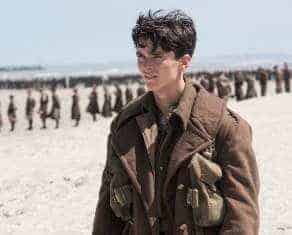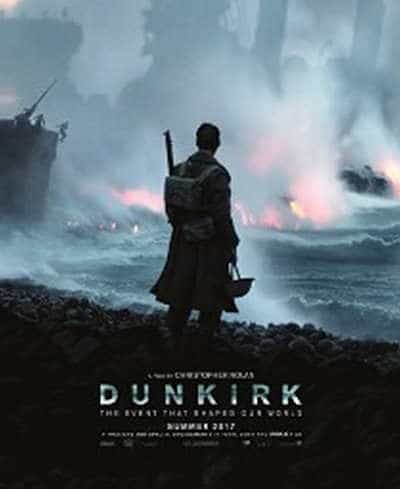When your back’s against the wall, and the enemy’s closing in fast, and all hope appears lost, it might be a good time to consider praying.
That’s what faced England in May 1940. In early World War 2, Hitler’s war machine had roared through France, pinning about 400,000 Allied troops on the beaches at Dunkirk, by the English Channel. German Panzer tanks were advancing quickly. Surrender or annihilation seemed imminent.
Against huge odds, the Brits mounted a sea evacuation. From May 26 to June 4, a drama unfolded that inspired millions and significantly influenced the war’s outcome. Warner Bros.’ Dunkirk brings this epic story to the big screen.
The cast includes Oscar winner Mark Rylance (Bridge of Spies), Oscar nominees Tom Hardy (The Revenant) and Kenneth Branagh (My Week with Marilyn), plus One Direction band member Harry Styles. Christopher Nolan (The Dark Knight Trilogy) wrote and directed.
Miracle needed
The film focuses on land (infantry on the beach), sea (navy and civilian evacuation efforts), and air (plane combat).
Initial prospects looked bleak. British General Alan Brooke said, “Nothing but a miracle can save the BEF [British Expeditionary Force] now.” New Prime Minister Winston Churchill (he took office May 10) had predicted that 30,000 could be evacuated successfully. In the end, 338,000 troops crossed the Channel. What happened?
A fortuitous – some would say providential – combination of courage, civilian involvement, German errors, and weather intervened. It’s been called the “Miracle of Dunkirk.”
Hitler’s error; England’s prayers and ships
On May 24, Germans halted their tanks near Dunkirk, letting their Luftwaffe (air force) take over. Big mistake, creating extra Allied evacuation preparation time.
Why the decision? Several theories: Some German generals said Hitler wanted peace with Britain; capture or slaughter could have hampered that. Perhaps Hitler deferred to Luftwaffe chief Hermann Göring. Possibly a Hitler power play reigned in an overly aggressive Panzer commander.
Across the Channel, British civilians mobilized their motorboats, yachts and lifeboats to help the Royal Navy bring troops to safety.
King George (the current Queen Elizabeth’s father) called for a national day of prayer. Millions across England entered churches on May 26 to pray for success.
Starting May 27, a flotilla of naval and civilian vessels – “The Little Ships,” sailed by both naval and civilian personnel – crossed the Channel in “Operation Dynamo.” The Luftwaffe attacked the boats and the Allies on Dunkirk beaches.
Weather coincidences?
Timing was critical. Nature intervened, in two ways.
Historian Alan Axelrod notes, “Fortunately for the Allies, the notoriously treacherous English Channel was calm [facilitating The Little Ships’ crossing], yet the weather was overcast, greatly limiting the Luftwaffe’s ability to launch attacks.”
Weather coincidences? Hmmm. After the evacuation, British churches sang biblical Psalm 124: “Praise the Lord, who did not let their teeth tear us apart! We escaped like a bird from a hunter’s trap. The trap is broken, and we are free! Our help is from the Lord, who made heaven and earth.”
Dunkirk downsides

Copyright © 2017 Warner Bros. ALL RIGHTS RESERVED
Photo: Melinda Sue Gordon
As with any war, not everything went well. Around 3,500 British perished; about 60,000 French became POWs. At first, Brits concealed evacuation plans from the French and Belgians, counting on them to continue combat. Nevertheless, French, Belgians and Poles composed 140,000 of the 338,000 evacuees.
Critics feel some “Dunkirk miracle” accounts inflate The Little Ships’ contribution. Civilians rescued only 26,500 of the 338,000 evacuees. But seafaring civilians’ courage and sacrifice – “the Dunkirk spirit” – certainly boosted national morale.
That spirit plus the successful evacuation helped motivate a somewhat reticent US to support the British war effort. (Pearl Harbor was still eighteen months future.)
“We shall fight on the beaches….”

Copyright © 2017 Warner Bros. ALL RIGHTS RESERVED
Photo: Melinda Sue Gordon
Director Nolan has described Dunkirk as “an essential … decisive moment” in WW2: “If this evacuation had not been a success, Great Britain would have been obliged to capitulate. And the whole world would have been lost, or would have known a different fate: the Germans would undoubtedly have conquered Europe, the US would not have returned to war. It is a true point of rupture in war and in [the] history of the world.”
Churchill – admitting evacuation was not victory – portrayed it as a successful retreat to regroup and fight another day. In his famous June 4 address to Parliament, he vowed, “We shall fight on the beaches, we shall fight on the landing grounds, we shall fight in the fields and in the streets, we shall fight in the hills. We shall never surrender.”
Dunkirk – both the film and the entire story – can inspire today’s generation to persist in opposing evil despite overwhelming odds. The film omits the national prayer element, but the film website includes it. Knowing the whole story especially made me want to stand up and cheer as I watched.
Rated PG-13 (USA) “for intense war experience and some language.”
www.DunkirkMovie.com Opens July 21 (North America) International Release Dates
Rusty Wright is an author and lecturer who has spoken on six continents. He holds Bachelor of Science (psychology) and Master of Theology degrees from Duke and Oxford universities, respectively. www.RustyWright.com
Rusty Wright is an award-winning author, lecturer, journalist and syndicated columnist who has spoken on six continents to university students, professors, executives, diplomats and professional athletes. He’s appeared on television talk shows in cities around the world and also trains professionals in effective communication. Rusty’s material has appeared in mainstream newspapers across the US and has been used in any of 14 languages by over 2,000 websites. He holds Bachelor of Science (psychology) and Master of Theology degrees from Duke and Oxford universities, respectively. www.RustyWright.com



